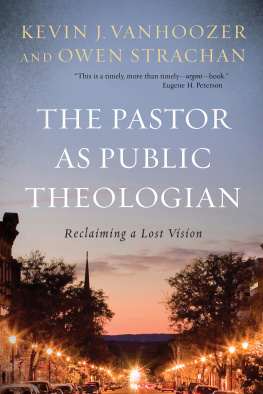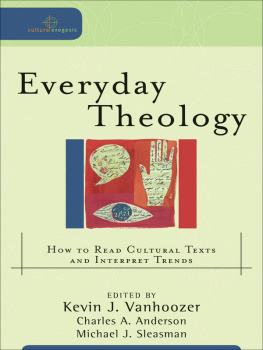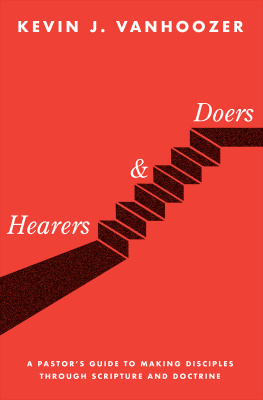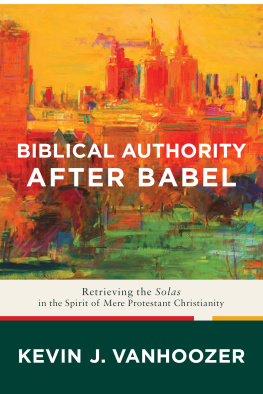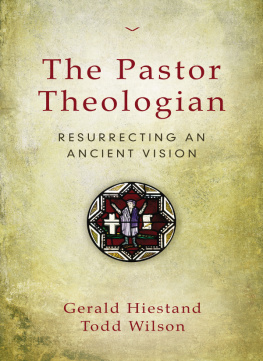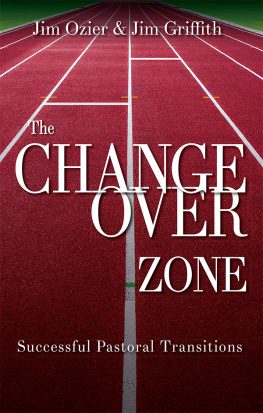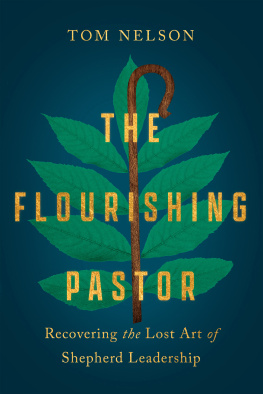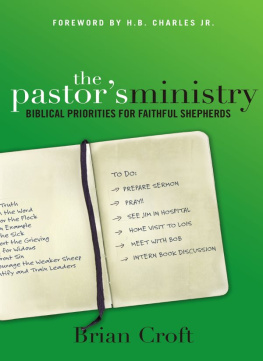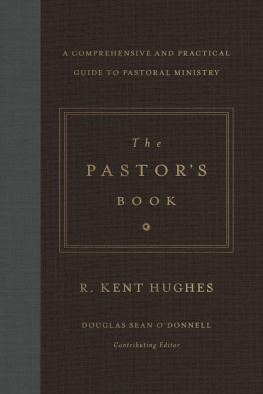Kevin J. Vanhoozer - The Pastor as Public Theologian: Reclaiming a Lost Vision
Here you can read online Kevin J. Vanhoozer - The Pastor as Public Theologian: Reclaiming a Lost Vision full text of the book (entire story) in english for free. Download pdf and epub, get meaning, cover and reviews about this ebook. year: 2015, publisher: Baker Publishing Group, genre: Religion. Description of the work, (preface) as well as reviews are available. Best literature library LitArk.com created for fans of good reading and offers a wide selection of genres:
Romance novel
Science fiction
Adventure
Detective
Science
History
Home and family
Prose
Art
Politics
Computer
Non-fiction
Religion
Business
Children
Humor
Choose a favorite category and find really read worthwhile books. Enjoy immersion in the world of imagination, feel the emotions of the characters or learn something new for yourself, make an fascinating discovery.
- Book:The Pastor as Public Theologian: Reclaiming a Lost Vision
- Author:
- Publisher:Baker Publishing Group
- Genre:
- Year:2015
- Rating:4 / 5
- Favourites:Add to favourites
- Your mark:
- 80
- 1
- 2
- 3
- 4
- 5
The Pastor as Public Theologian: Reclaiming a Lost Vision: summary, description and annotation
We offer to read an annotation, description, summary or preface (depends on what the author of the book "The Pastor as Public Theologian: Reclaiming a Lost Vision" wrote himself). If you haven't found the necessary information about the book — write in the comments, we will try to find it.
The Pastor as Public Theologian: Reclaiming a Lost Vision — read online for free the complete book (whole text) full work
Below is the text of the book, divided by pages. System saving the place of the last page read, allows you to conveniently read the book "The Pastor as Public Theologian: Reclaiming a Lost Vision" online for free, without having to search again every time where you left off. Put a bookmark, and you can go to the page where you finished reading at any time.
Font size:
Interval:
Bookmark:
2015 by Kevin J. Vanhoozer and Owen Strachan
Published by Baker Academic
a division of Baker Publishing Group
P.O. Box 6287, Grand Rapids, MI 49516-6287
www.bakeracademic.com
Ebook edition created 2015
Ebook corrections 09.26.2019
All rights reserved. No part of this publication may be reproduced, stored in a retrieval system, or transmitted in any form or by any meansfor example, electronic, photocopy, recordingwithout the prior written permission of the publisher. The only exception is brief quotations in printed reviews.
Library of Congress Cataloging-in-Publication Data is on file at the Library of Congress, Washington, DC.
ISBN 978-1-4412-4572-4
Unless otherwise indicated, all Scripture quotations are from The Holy Bible, English Standard Version (ESV), copyright 2001 by Crossway, a publishing ministry of Good News Publishers. Used by permission. All rights reserved. ESV Text Edition: 2007
Scripture quotations labeled NIV are from the Holy Bible, New International Version. NIV. Copyright 1973, 1978, 1984, 2011 by Biblica, Inc. Used by permission of Zondervan. All rights reserved worldwide. www.zondervan.com
Scripture quotations labeled RSV are from the Revised Standard Version of the Bible, copyright 1952 [2nd edition, 1971] by the Division of Christian Education of the National Council of the Churches of Christ in the United States of America. Used by permission. All rights reserved.
Contents
Owen Strachan and Kevin J. Vanhoozer
Kevin J. Vanhoozer
Owen Strachan
Owen Strachan
Kevin J. Vanhoozer
Kevin J. Vanhoozer
Kevin J. Vanhoozer
Preface
The idea for this book began with a shock (in a cemetery) and a scandal (in a seminary). Kevin was teaching in the University of Edinburgh when he happened to overhear two American tourists visiting Greyfriars Kirk (most come to see the statue of Greyfriars Bobby). The couple were looking at headstones when the wife suddenly blurted out, Look, honey: they buried two people in one grave! What makes you think that? asked her husband. The woman replied: It says so right here: Here lies a pastor and a theologian.
It is not comic but tragic that we instantly understand whats funny about the anecdote, namely, the source of the womans confusion. The average American is simply not used to thinking of pastors as theologians or theologians as pastors. However, for much of church history, the distinction we today take for granted would have been viewed as an aberration. What happened? The reasons are complex, and though we will mention some of them, the primary focus of our book lies not in understanding how we got here, but rather in proposing how best to move forward.
As to the seminary scandal, it happened during Kevins office hours. A bright student came to ask advice about his future. Jordan (not his real name) was struggling between wanting to pursue further theological studies, which in his case meant applying for a PhD, and working in a church. He was not sure his grades were good enough (which was code for Am I intelligent enough?) to get into a doctoral program. Please dont tell me Im only smart enough to be a pastor, he pleaded. I found the implication that pastors were somehow second-class intellects wrong-headed. It took me a few moments to rightly order my righteous indignation and collect my thoughts. Then I replied: I regret to inform you that you may not have the right stuff. It takes wisdom and joyful enthusiasm to be a pastor. To get a doctorate, you need only have a modicum of intelligence and the ability to grind it out. Im afraid you may only be qualified to be an academic, not a pastor. Ministry is a lot harder than scholarship.
These two anecdotes are revealing symptoms of a deeper problem, a vision problem that afflicts the twenty-first-century church, especially in North American evangelicalism. Though there are some shining exceptions, by and large there is widespread confusion about the nature, identity, and role of the pastor.
Elsewhere Kevin has said that the pastor-theologian ought to be evangelicalisms default public intellectual. This claim intrigued Owen, a former doctoral student, eventually prompting him to ask Kevin to coauthor the present book. Kevin and Owen had earlier worked together in connection with the Center for Pastor Theologians (formerly known as the Society for Advanced Ecclesial Theology), a fellowship of pastors with PhDs committed to engaging in biblical and theological scholarship for the twin purpose of the theological renewal of the church and the ecclesial renewal of theology. We briefly toyed with the title The Pastor as Public Intellectual , only to realize that, as a stand-alone title, it would probably be misunderstood. The original idea has nevertheless sneaked its way back into these pages. Readers are therefore advised to pay special attention to what we mean by public and intellectual, and why we qualify both with theological.
So much for the origins of the book. As to the actual process of coauthoring, we quickly came up with the books general structure after a little brainstorming. Owen wrote chapters 1 and 2 while Kevin wrote chapters 3 and 4, as well as the preface, introduction, and conclusion. Next we read and commented on each others drafts, then revised accordingly. We are particularly grateful to the twelvenot our disciples but rather our partners in the ministry of the gospelwho have contributed testimonies to the importance of reclaiming the vision of the pastorate as a theological vocation. These twelve affidavitstestimonies from everyday ministerial lifeprovide concrete evidence that the vision we set forth, far from being an abstract ideal, is indeed being lived out on the ground. They also provide practical advice about how to make our vision more visible in the local church. These twelve minor (i.e., in terms of length) prophets give our books argument, if not street cred, perhaps a bit more pew cred.
Speaking of credibility, what gives us, two professor theologians, the right to issue statements about the nature and role of the pastor ? We are acutely conscious of our lack of qualification. To be a theologian in the academy is to risk becoming a disembodied mind. To return to the graveyard: the theologian who is not a pastor is like a soul that, after death, has been separated from its body (i.e., the church). We regret this unnatural intermediate state, but as believers in resurrection, we look forward to the time when body and soul are reunited.
Theological minds belong in ecclesial bodies. We dont wish to exaggerate: there is a place for academic theology, but it is second place. First placepride of theological placebelongs to the pastor-theologian. It is therefore only fitting that we dedicate this work to Gerald Hiestand and Todd Wilson, cofounders of the Center for Pastor Theologians, and to all the members of the Centers two Fellowships. These exemplary pastor-theologians embody the vision our book seeks to reclaim. May they be fruitful and multiply!
Owen Strachan
Kevin J. Vanhoozer
Introduction
Pastors, Theologians, and Other Public Figures
KEVIN J. VANHOOZER
The church, the society of Jesus, is similarly in danger of becoming secular, and in the very place where we would least expect it: its understanding of the clergy. This is not because churches are dispensing with the pastorate, but because they no longer find its theological character particularly exciting or intelligible. The idea of the pastor as a theologianone who opens up the Scriptures to help people understand God, the world, and themselvesno longer causes the hearts of most church members to burn within them (Luke 24:32).
Too many pastors have exchanged their vocational birthright for a bowl of lentil stew (Gen. 25:2934; Heb. 12:16): management skills, strategic plans, leadership courses, therapeutic techniques, and so forth. Congregations expect their pastors to have these qualifications, and if pastors have an MBA, well then, so much the better. In these circumstances, it is hardly surprising that newly installed pastors so often complain that their seminaries failed to prepare them for the real work of ministry. Meanwhile, seminaries race to catch up to new expectations, reforming their curricula in ways that result in an even greater loss of theology in the church.
Next pageFont size:
Interval:
Bookmark:
Similar books «The Pastor as Public Theologian: Reclaiming a Lost Vision»
Look at similar books to The Pastor as Public Theologian: Reclaiming a Lost Vision. We have selected literature similar in name and meaning in the hope of providing readers with more options to find new, interesting, not yet read works.
Discussion, reviews of the book The Pastor as Public Theologian: Reclaiming a Lost Vision and just readers' own opinions. Leave your comments, write what you think about the work, its meaning or the main characters. Specify what exactly you liked and what you didn't like, and why you think so.

